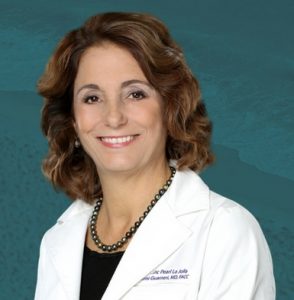Live Better Now – Part 2

In Part 1 of Live Better Now, Mimi Guarneri, MD, a founding board member of the American Board of Integrative Medicine® (ABOIM®) and a board-certified physician in cardiovascular disease, internal medicine, and integrative holistic medicine, said that inflammation was one of the root causes and final common pathways of diseases. She also identified the 10 hidden causes of inflammation, including sugar, food sensitivities, midline weight, stress, and sleep disturbance. In view of this, what can we do to avoid inflammation and improve our health?
The Seven Steps to Optimal Health
Dr. Guarneri asks us to imagine that we are trees. Now, imagine that our trunk is our DNA and the flowers or fruit we bear is a chronic disease, whether it’s diabetes, high cholesterol, high blood pressure, or arthritis. How would we treat a sick tree? Pruning it of bad fruit or leaves would be one way, but the illness would still be at the root. So, fertilizing the soil – feeding the tree with the nutrients it needs – would be much better. It’s in the soil, Dr. Guarneri says, that our seven steps to optimal health reside. In the presence of nutrient-rich soil, our life choices interact with our DNA (the trunk) and determine whether we are healthy or sick.
Dr. Guarneri cites the case of a woman who had been suffering so intensely from chronic migraines that she no longer wanted to live. Her family brought her to Dr. Guarneri. After a comprehensive assessment, it was clear to Dr. Guarneri that the woman had an unhealthy digestive system. She had been suffering from gas, bloating, heartburn, and constipation, so, Dr. Guarneri treated her by fixing her microbiome. She put the woman on a healthy diet and soon discovered that gut inflammation was ultimately the cause of her headaches.
Ayurvedic medicine asserts that with the right food and a healthy gut, you don’t need meds. In fact, gut inflammation is recognized as the root cause of many common ailments, such as heart disease, cognitive decline, and depression. This brings us to the seven steps of optimal health:
- Food first – You are what you eat. Get proper macronutrients, like fats, protein, and carbohydrates, as well as micronutrients like vitamins and minerals. To improve your health, the first thing to do, Dr. Guarneri advises, is to clean out our pantries. She encourages us to take the two-week challenge: Eliminate sugar in all its forms. This means no alcohol, no sugar, and no simple carbs. Also, eliminate gluten and dairy, which can lead to everything from arthritis to skin rashes. Substitute these foods with fruits, and vegetables like broccoli, cauliflower, and kale, which taste good and has fiber that fills us up. Additionally, we should drink lots of water and choose healthier forms of protein, like lentil soup.
- Balance your hormones – When hormones are unbalanced, we can experience fatigue, weight gain, anxiety, and more. That’s why it’s important that we get our thyroids checked and our hormone levels assessed, in particular, our adrenal – or stress – hormones, such as epinephrine, norepinephrine, and cortisol. High cortisol can cause midline weight gain and contributes to diabetes and high blood pressure.
- Get physically active – Even small amounts of physical activity are associated with significant health benefits. Exercise leads to lower blood sugar and triglyceride levels, helps control midline weight, and improves our sleep as well as our mood.
- Get a good night’s sleep – To do this, we should limit our intake of alcohol, sugar, and dark chocolate. And, at bedtime, we should put away light sources such as computers and cell phones.
- Get to Know Your Genes – Genes are not destiny, but our genetic makeup has huge impacts on our health. Our genes are related to our body mass index, how we metabolize drugs, and our predisposition to chronic diseases, such as diabetes, high blood pressure, and high cholesterol. That’s why we should learn what foods and supplements we need based on our individual genetics. Today’s technology allows assessment of our genes through blood and saliva testing. Remember, Dr. Guarneri says, how we live our lives – i.e., what foods we choose to eat – supersedes genetics.
- Transform Your Stress Response – How we see the world affects our health. In other words, our response to events can determine whether we are happy, depressed, lonely, or anxious, and these emotional states affect our well-being. Simply put, stress can make you ill. We need not only medication, Dr. Guarneri suggests, but also meditation. She cites a study in which a group of random patients with high blood pressure saw a 48 percent reduction in their risk of heart attack, stroke, and sudden death by meditating 20 minutes twice a day.
- Connection – For better health, we should strengthen our bonds with people, nature, and our purpose – essentially, to what matters most in our lives.
Dr. Guarneri encourages us to take these seven steps, to find more joy, and to love more, not only other people, but also ourselves. Choose the path to health, she says. Love yourself enough to choose health and live better now.
The American Board of Physician Specialties and its Member Board the ABOIM support Dr. Guarneri’s efforts at educating the public about the science of integrative health in order to achieve optimal health and well-being. With interest in integrative health practices on the rise, the ABPS offers physician board certification in integrative medicine through the ABOIM. To learn more about this specialty, or for information about integrative medicine certification, contact the ABPS today.










